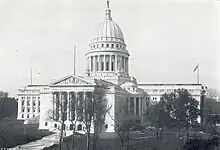| 54th Wisconsin Legislature | |||||
|---|---|---|---|---|---|
| |||||
 Wisconsin State Capitol ca.1915 | |||||
| Overview | |||||
| Legislative body | Wisconsin Legislature | ||||
| Meeting place | Wisconsin State Capitol | ||||
| Term | January 6, 1919 – January 3, 1921 | ||||
| Election | November 5, 1918 | ||||
| Senate | |||||
| Members | 33 | ||||
| Senate President | Edward Dithmar (R) | ||||
| President pro tempore | Willard T. Stevens (R) | ||||
| Party control | Republican | ||||
| Assembly | |||||
| Members | 100 | ||||
| Assembly Speaker | Riley S. Young (R) | ||||
| Party control | Republican | ||||
| Sessions | |||||
| |||||
| Special sessions | |||||
| |||||
The Fifty-Fourth Wisconsin Legislature convened from January 8, 1919, to July 30, 1919, in regular session, and re-convened in two special sessions in September 1919 and May 1920.[1]
Senators representing odd-numbered districts were newly elected for this session and were serving the first two years of a four-year term. Assembly members were elected to a two-year term. Assembly members and odd-numbered senators were elected in the general election of November 5, 1918. Senators representing even-numbered districts were serving the third and fourth year of a four-year term, having been elected in the general election of November 7, 1916.[1]
Major events
- January 16, 1919: The Eighteenth Amendment to the United States Constitution, establishing the prohibition of alcohol, was ratified by the requisite number of states to come into force.
- January 21, 1919: The Irish Republic declared independence from the United Kingdom, initiating the Irish War of Independence.
- January 25, 1919: The League of Nations was founded in Paris.
- June 28, 1919: The Treaty of Versailles was signed, formalizing Germany's settlement with the Entente at the end of World War I.
- August 11, 1919: The Green Bay Packers American football club was founded by Curly Lambeau and George Whitney Calhoun.
- October 2, 1919: U.S. President Woodrow Wilson suffered a severe stroke, leaving him partially paralyzed, with permanent neurological damage.
- October 28, 1919: The U.S. Congress overrode President Woodrow Wilson's veto of the Volstead Act, which established prohibition of alcohol enabled by the new 18th amendment.
- November 30, 1919: Health officials declared an end to the Spanish flu pandemic.
- March 19, 1920: The U.S. Senate failed in its last attempt to ratify the Treaty of Versailles. Wisconsin's senior U.S. senator Robert M. La Follette was among the leading "irreconcilable" holdouts preventing ratification.
- April 6, 1920: Wisconsin voters rejected two amendments to the state constitution:
- to allow legislator pay to be set by law rather than fixed in the constitution.
- to allow the legislature to decrease the number of state judicial circuits while maintaining or increasing the number of judges.
- July 13, 1920: Wisconsin chief justice John B. Winslow died in office. Justice Robert G. Siebecker immediately succeeded to the position of chief justice due to the rule of seniority.
- August 18, 1920: The Nineteenth Amendment to the United States Constitution, guaranteeing women the right to vote, was ratified by the requisite number of states to come into force.
- September 6, 1920: Attorney Burr W. Jones was appointed a justice of the Wisconsin Supreme Court by Governor Emanuel L. Philipp, to fill the vacancy caused by the death of chief justice John B. Winslow.
- November 2, 1920: 1920 United States general election:
- Warren G. Harding elected President of the United States.
- John J. Blaine elected Governor of Wisconsin.
- Irvine Lenroot re-elected United States senator from Wisconsin.
- December 1, 1920: Mexican revolutionary general Álvaro Obregón was inaugurated as president of Mexico, effectively ending the Mexican Revolution.
Major legislation
- Joint Resolution ratifying an amendment to the constitution of the United States relating to intoxicating liquors, 1919 Joint Resolution 1. Wisconsin's ratification of the Eighteenth Amendment to the United States Constitution.
- Joint Resolution relating to the league of nations, 1919 Joint Resolution 26. Endorsed the League of Nations and supported the United States joining.
- Joint Resolution relating to the establishment of a Jewish State of Palestine and for the granting of complete liberty to the Jewish people in all countries, 1919 Joint Resolution 34.
- Joint Resolution to amend section 21 of article IV of the constitution, relating to compensation of members of the legislature, 1919 Joint Resolution 37. Second legislative passage of a proposed amendment to the state constitution to allow the Legislature to set its own salary through the normal legislative process. The amendment was defeated by voters in the April 1920 election.
- Joint Resolution to amend section 4 of article VI of the constitution, relating to county officers, 1919 Joint Resolution 38. First legislative passage of a proposed amendment to the state constitution to remove term limits for sheriffs.
- Joint Resolution to amend sections 6 and 7, of article VII, of the constitution of the state of Wisconsin, relating to circuit judges, 1919 Joint Resolution 47. Second legislative passage of a proposed amendment to the state constitution to allow the Legislature to decrease the number of state judicial circuits. This amendment was also defeated by voters in the April 1920 election.
- Joint Resolution memorializing congress in behalf of the farmers to repeal the law advancing the time one hour, 1919 Joint Resolution 48. Communicating to Congress disapproval of daylight saving time.
- Joint Resolution to create section 3b of article XI of the constitution, relating to the indebtedness of municipal corporations, 1919 Joint Resolution 53. First legislative passage of a proposed amendment to the state constitution to extend the allowance for municipal indebtedness for the purpose of establishing street rail projects or for heat, water, and power utility purposes.
- Joint Resolution to amend section 5, article I, of the constitution, relating to trial by jury, 1919 Joint Resolution 58. First legislative passage of a proposed amendment to the state constitution to change the jury rules for civil cases to require a minimum of five-sixths majority for a valid verdict.
- Joint Resolution ratifying an amendment to the constitution of the United States relating to woman's suffrage, 1919 Joint Resolution 64. Wisconsin's ratification of the Nineteenth Amendment to the United States Constitution.
Party summary
Senate summary

| Party (Shading indicates majority caucus) |
Total | ||||
|---|---|---|---|---|---|
| Dem. | Soc. | Rep. | Vacant | ||
| End of previous Legislature | 6 | 2 | 24 | 32 | 1 |
| Start of 1st Session | 2 | 4 | 27 | 33 | 0 |
| Final voting share | 18.18% | 81.82% | |||
| Beginning of the next Legislature | 2 | 4 | 27 | 33 | 0 |
Assembly summary

| Party (Shading indicates majority caucus) |
Total | ||||
|---|---|---|---|---|---|
| Dem. | Soc. | Rep. | Vacant | ||
| End of previous Legislature | 13 | 8 | 79 | 100 | 0 |
| Start of 1st Session | 6 | 16 | 78 | 100 | 0 |
| From May 1, 1919[note 1] | 77 | 99 | 1 | ||
| From Nov. 19, 1919[note 2] | 76 | 98 | 2 | ||
| Final voting share | 22.45% | 77.55% | |||
| Beginning of the next Legislature | 2 | 6 | 92 | 100 | 0 |
Sessions
- Regular session: January 8, 1919 – July 30, 1919
- September 1919 special session: September 4, 1919 – September 8, 1919
- May 1920 special session: May 25, 1920 – June 4, 1920
Leaders
Senate leadership
- President of the Senate: Edward Dithmar (R)
- President pro tempore: Willard T. Stevens (R–Rhinelander)
Assembly leadership
Members
Members of the Senate
Members of the Senate for the Fifty-Fourth Wisconsin Legislature:[2]
Members of the Assembly
Members of the Assembly for the Fifty-Fourth Wisconsin Legislature:[2]
Committees
Senate committees
- Senate Standing Committee on Committees – I. P. Witter, chair
- Senate Standing Committee on Contingent Expenditures – H. E. Roethe, chair
- Senate Standing Committee on Corporations – J. H. Bennett, chair
- Senate Standing Committee on Education and Public Welfare – A. J. Pullen, chair
- Senate Standing Committee on Highways – L. E. Cunningham, chair
- Senate Standing Committee on the Judiciary – T. Benfey, chair
- Senate Standing Committee on Legislative Procedure – W. T. Stevens, chair
- Senate Standing Committee on Reconstruction and Readjustment – R. P. Wilcox, chair
- Senate Standing Committee on State Affairs – W. T. Stevens, chair
Assembly committees
- Assembly Standing Committee on Agriculture – S. R. Webster, chair
- Assembly Standing Committee on Commerce and Manufactures – J. E. Johnson, chair
- Assembly Standing Committee on Contingent Expenditures – J. W. Conner, chair
- Assembly Standing Committee on Education – M. L. Hineman, chair
- Assembly Standing Committee on Elections – W. R. Chipman, chair
- Assembly Standing Committee on Engrossed Bills – E. F. Ganz, chair
- Assembly Standing Committee on Enrolled Bills – C. E. Hanson, chair
- Assembly Standing Committee on Excise and Fees – J. C. Anderson, chair
- Assembly Standing Committee on Fish and Game – H. Kandutsch, chair
- Assembly Standing Committee on Highways – J. J. Ruka, chair
- Assembly Standing Committee on Insurance and Banking – J. C. Chapple, chair
- Assembly Standing Committee on the Judiciary – T. S. Nolan, chair
- Assembly Standing Committee on Labor – J. H. Jensen, chair
- Assembly Standing Committee on Municipalities – F. N. Graass, chair
- Assembly Standing Committee on Printing – G. H. Hood, chair
- Assembly Standing Committee on Public Welfare – R. B. Melvin, chair
- Assembly Standing Committee on Revision – W. F. Dettinger, chair
- Assembly Standing Committee on Rules – J. F. Buckley, chair
- Assembly Standing Committee on State Affairs – A. Johnson, chair
- Assembly Standing Committee on Taxation – W. H. Edwards, chair
- Assembly Standing Committee on Third Reading – G. E. Ansorge, chair
- Assembly Standing Committee on Transportation – C. H. Carter, chair
Joint committees
- Joint Standing Committee on Finance – A. H. Wilkinson (Sen.) & C. Kurtenacker (Asm.), co-chairs
- Joint Special Committee on Drainage – I. P. Witter (Sen.), chair
- Joint Special Committee for the Historical Society Investigation – H. E. Roethe (Sen.), chair
- Joint Special Committee for the International Harvester Co. Investigation – J. H. Bennett (Sen.), chair
- Joint Special Committee on Legislative Visiting – E. F. Clark (Sen.), chair
- Joint Special Committee for the Milwaukee Street Railway Investigation – G. B. Skogmo (Sen.), chair
- Joint Special Committee on Pensions, Annuities, and Retirement Funds for Teachers – A. Kuckuk (Sen.), chair
Employees
Senate employees
- Chief Clerk: Oliver G. Munson[3]
- Assistant Chief Clerk: C. E. Mullen
- Sergeant-at-Arms: John Turner
- Assistant Sergeant-at-Arms: Olaf Goldstrand
- Postmaster: Frank C. Densmore
Assembly employees
- Chief Clerk: C. E. Shaffer[3]
- Journal Clerk: Charles E. Tuffley
- Sergeant-at-Arms: Thomas Grant Cretney
- Assistant Sergeant-at-Arms: E. F. Wright
- Postmaster: J. E. Barnard
Notes
- ↑ Republican Levi Withee Gibson (Taylor County) died.
- ↑ Republican Eber Simpson (Winnebago County) died.
References
- 1 2 Barish, Lawrence S.; Lemanski, Lynn, eds. (2021). "Historical Lists" (PDF). State of Wisconsin Blue Book 2021–2022 (Report). Wisconsin Legislative Reference Bureau. pp. 467, 471, 475, 479–480. ISBN 978-1-7333817-1-0. Retrieved March 11, 2023.
- 1 2 Hunter, Paul F., ed. (1919). "Biographical Sketches". The Wisconsin Blue Book 1919 (Report). Wisconsin State Printing Board. pp. 451–508. Retrieved June 23, 2023.
- 1 2 Hunter, Paul F., ed. (1919). "Organization of Legislature, 1919". The Wisconsin Blue Book 1919 (Report). Wisconsin State Printing Board. pp. 446–449. Retrieved June 23, 2023.